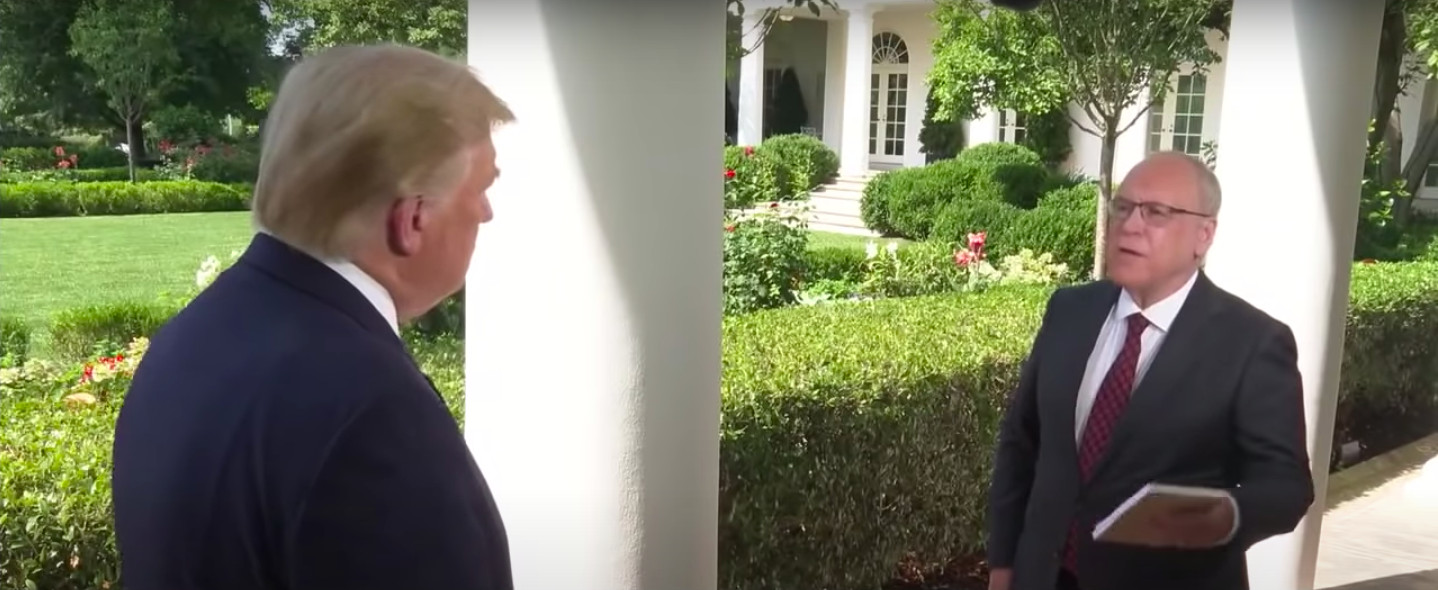Sign up for the daily CJR newsletter.
When it came to asking the president about his mental soundness last week, which Fox News reporter extracted the more revealing answer?
First up was Chris Wallace, the tough Fox News Sunday anchor, who said this about the Montreal Cognitive Assessment test that Trump so proudly passed: “I took the test too when I heard that you passed it,” said Wallace. “It’s not—well, it’s not the hardest test. They have a picture, and it says, ‘What’s that?’ And it’s an elephant.”
A few days later, Dr. Marc Siegel, Fox News’s medical commentator, asked Trump about the same topic, but framed his inquiry this way: “Presidential health, or health of the candidate, is going to be on the table.… I’ve seen a lot about your health, being in good health. What do you think should come out…regarding Vice President Biden?”
Wallace’s question may have been more emotionally satisfying, but it was Siegel—a commentator prone to adulation of Trump—who got the more telling answer: a six-minute meander through Trump’s thicket of self-diagnosis, during which the president mentioned China, Russia, Ukraine, judicial appointments, the Twenty-fifth Amendment, and, most notably, his ability to recite a string of five words while under observation by medical experts. The camera, trained mostly on Trump, occasionally cut to Siegel, who smiled sweetly and nodded understandingly, barely uttering a word as the president repeated “Person, woman, man, camera, TV” four times.
After Siegel’s interview went viral, he went on Tucker Carlson’s show to explain his interviewing style: “That’s been asked of me a lot: ‘Why didn’t you interrupt him on the cognitive question?’ Well, I was brought up not to interrupt people.… It’s a sign of respect.”
THE MEDIA TODAY: The logistical and ethical challenges of sports reporters’ restart
Softball questions aren’t considered a standard part of the journalistic canon. Journalists lionize reporters like Chris Wallace’s father, Mike, who once asked the Ayatollah Khomeini how he felt about being called a lunatic, or Oriana Fallaci, whose brutal interview of Henry Kissinger would become, in his words, “the single most disastrous conversation I have ever had with any member of the press.”
There’s an important difference between a softball question and the dear-leader sycophancy that a TV personality like Fox’s Maria Bartiromo demonstrates—most recently in May, when she asked Trump, “I’ve never seen anybody take a punch and then get right back up and keep punching. I mean, where does this resilience come from?”
None of this means that reporters should avoid difficult questions; they’re essential for many stories. But occasionally, a hard question puts the president—or someone of his ego—on the defensive, while the gentle one prods him to be more candid than he intended.
Two days after the Siegel interview, Trump was back before the cameras at the White House, this time being interviewed by Dave Portnoy, the founder of Barstool Sports. Portnoy can be caustic—as well as misogynistic and racist—but at the White House, he became a tail-wagging puppy, seeking Trump’s approval in return for a morsel or two. And it worked.
After beginning the interview by praising Trump because he didn’t fall for an Ali G interview years ago, Portnoy then asked the president how the country can “close the divide.… It seems like half the country hates the other half.… How do we bring it together?”
Trump’s answer: “Success.… The best employment numbers in the history of our country.… Best stock market we’ve ever had.… Everybody was making a lot of money…and then China sent us this horrible, bad present.”
Portnoy’s question is as easy as it gets for politicians, most of whom would gush a paean to American history and vow to bring the country together. Not Trump. He can’t countenance the idea that the chasm goes beyond the stock or job market to issues of equity, racial justice, or pandemic responses.
As their chat nears its end, Portnoy displays some self-awareness about what he’s doing. “I feel like so many interviews, they’re always coming from an agenda, positive or negative…they come at you hard, you just come back harder.… People say, ‘Is it presidential, is it not?’ And you just do your thing.”
Softball questions don’t always work. In March, as the pandemic was shuttering candidates indoors, CNN’s Brooke Baldwin tossed this hanging slider to Biden:
Really your strength is in traveling around the country and connecting with people, right. Connecting with voters. Looking them in the eye, a hug, handshake. Especially in these crucial months before the election. And you can’t do any of that right now. Mr. Vice President, does that worry you?
Biden parried that one with ease: “No, it doesn’t worry me. The thing that worries me is whether we get this under control.”
An occasional bonus with softball interviews is the surprise shown by reporters when they realize that the guest just unexpectedly delivered actual news. That happened in 2018, when the Stormy Daniels story was gaining steam, and Fox’s Sean Hannity hosted Trump lawyer Rudy Giuliani.
Hannity asked about Fusion GPS, a private investigative firm, and the dossier compiled by Christopher Steele on Trump’s presidential campaign. For some reason, Giuliani turned the discussion to the $130,000 hush payment—the one that Trump had denied being involved with. He tells Hannity, “That money was not campaign money, sorry. I’m giving you a fact that you don’t know. It’s not campaign money. No campaign finance violation.… They funneled it through a law firm, and the president repaid it.”
Hannity seemed taken aback by Giuliani’s candor. “Oh, I didn’t know that he did.” Neither did the rest of the country, until the president’s lawyer blurted it out, to one of his favorite interviewers.
ICYMI: A new media neighborhood for an emerging world
Has America ever needed a media defender more than now? Help us by joining CJR today.







